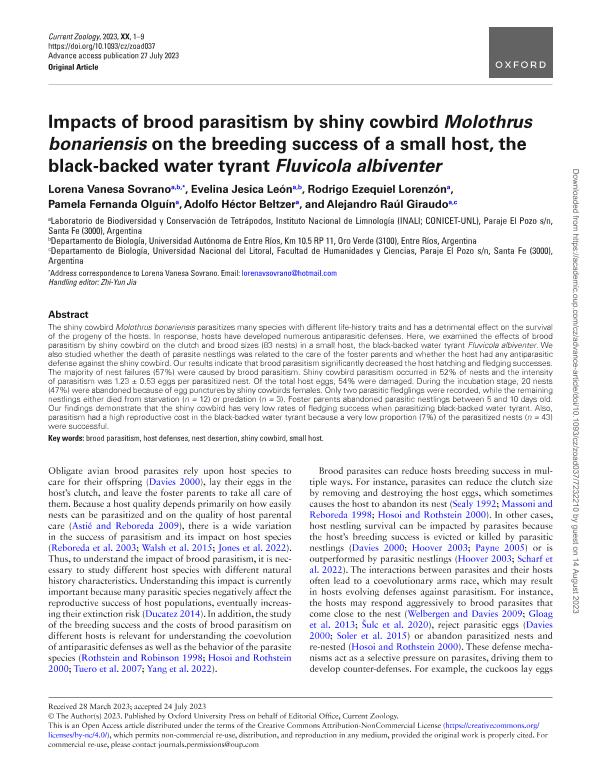Artículo
Impacts of brood parasitism by shiny cowbird Molothrus bonariensis on the breeding success of a small host, the black-backed water tyrant Fluvicola albiventer
Sovrano, Lorena Vanesa ; Leon, Evelina Jesica
; Leon, Evelina Jesica ; Lorenzón, Rodrigo Ezequiel
; Lorenzón, Rodrigo Ezequiel ; Olguin, Pamela Fernanda
; Olguin, Pamela Fernanda ; Beltzer, Adolfo Hector
; Beltzer, Adolfo Hector ; Giraudo, Alejandro Raul
; Giraudo, Alejandro Raul
 ; Leon, Evelina Jesica
; Leon, Evelina Jesica ; Lorenzón, Rodrigo Ezequiel
; Lorenzón, Rodrigo Ezequiel ; Olguin, Pamela Fernanda
; Olguin, Pamela Fernanda ; Beltzer, Adolfo Hector
; Beltzer, Adolfo Hector ; Giraudo, Alejandro Raul
; Giraudo, Alejandro Raul
Fecha de publicación:
07/2023
Editorial:
Oxford University Press
Revista:
Current Zoology
ISSN:
1674-5507
e-ISSN:
2396-9814
Idioma:
Inglés
Tipo de recurso:
Artículo publicado
Clasificación temática:
Resumen
The shiny cowbird Molothrus bonariensis parasitizes many species with different life-history traits and has a detrimental effect on the survival of the progeny of the hosts. In response, hosts have developed numerous antiparasitic defenses. Here, we examined the effects of brood parasitism by shiny cowbird on the clutch and brood sizes (83 nests) in a small host, the black-backed water tyrant Fluvicola albiventer. We also studied whether the death of parasite nestlings was related to the care of the foster parents and whether the host had any antiparasitic defense against the shiny cowbird. Our results indicate that brood parasitism significantly decreased the host hatching and fledging successes. The majority of nest failures (57%) were caused by brood parasitism. Shiny cowbird parasitism occurred in 52% of nests and the intensity of parasitism was 1.23 ± 0.53 eggs per parasitized nest. Of the total host eggs, 54% were damaged. During the incubation stage, 20 nests (47%) were abandoned because of egg punctures by shiny cowbirds females. Only two parasitic fledglings were recorded, while the remaining nestlings either died from starvation (n = 12) or predation (n = 3). Foster parents abandoned parasitic nestlings between 5 and 10 days old. Our findings demonstrate that the shiny cowbird has very low rates of fledging success when parasitizing black-backed water tyrant. Also, parasitism had a high reproductive cost in the black-backed water tyrant because a very low proportion (7%) of the parasitized nests (n = 43) were successful.
Palabras clave:
BROOD PARASITISM
,
HOST DEFENSES
,
NEST DESERTION
,
SHINY COWBIRD
,
SMALL HOST
Archivos asociados
Licencia
Identificadores
Colecciones
Articulos(CCT - SANTA FE)
Articulos de CTRO.CIENTIFICO TECNOL.CONICET - SANTA FE
Articulos de CTRO.CIENTIFICO TECNOL.CONICET - SANTA FE
Articulos(INALI)
Articulos de INST.NAC.DE LIMNOLOGIA (I)
Articulos de INST.NAC.DE LIMNOLOGIA (I)
Citación
Sovrano, Lorena Vanesa; Leon, Evelina Jesica; Lorenzón, Rodrigo Ezequiel; Olguin, Pamela Fernanda; Beltzer, Adolfo Hector; et al.; Impacts of brood parasitism by shiny cowbird Molothrus bonariensis on the breeding success of a small host, the black-backed water tyrant Fluvicola albiventer; Oxford University Press; Current Zoology; 7-2023; 1-9
Compartir
Altmétricas



